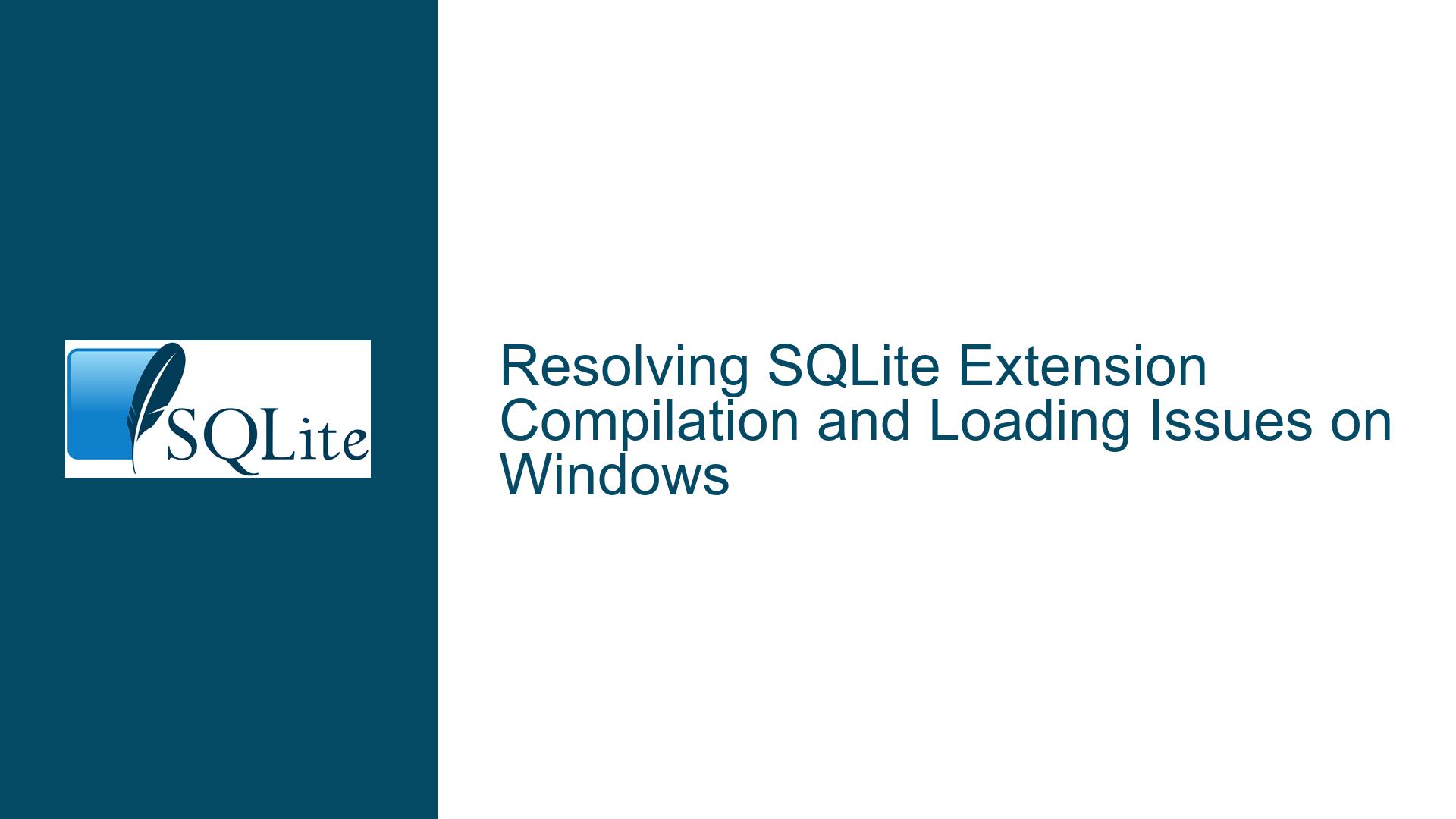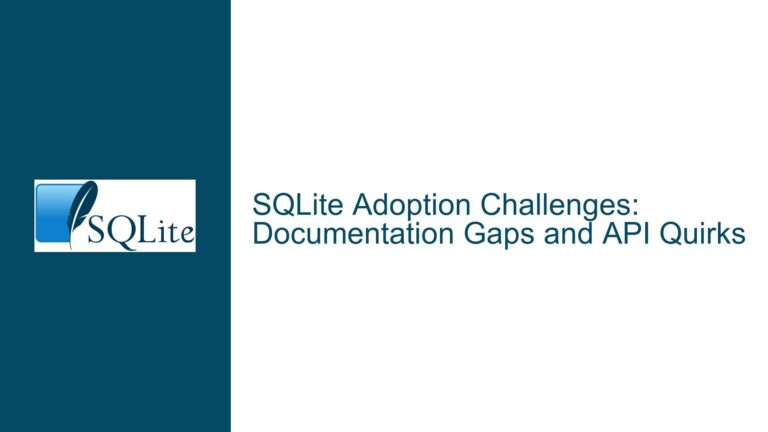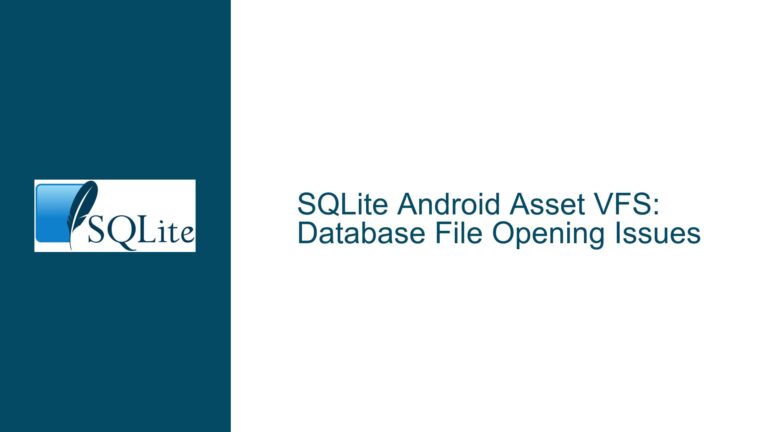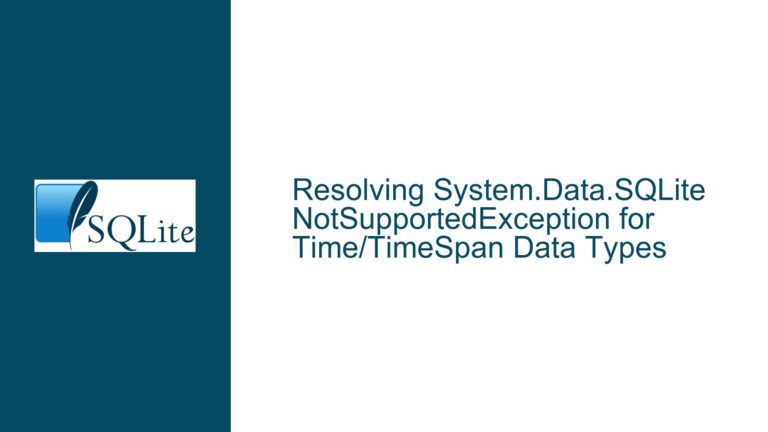Resolving SQLite Extension Compilation and Loading Issues on Windows
Compilation Errors and Missing SQLITE_SELFORDER1 Identifier
When attempting to compile the percentile.c extension for SQLite, a common issue arises due to version mismatches between the extension source code and the SQLite header file (sqlite3.h). The error message error C2065: 'SQLITE_SELFORDER1': undeclared identifier is a clear indicator that the sqlite3.h header file being used does not match the version required by the percentile.c extension. This discrepancy occurs because SQLITE_SELFORDER1 is a macro or constant introduced in SQLite version 3.47.0, and attempting to compile the extension with an older version of sqlite3.h will result in this error.
To resolve this, ensure that the sqlite3.h header file matches the version of SQLite for which the extension is being compiled. Specifically, if you are compiling the percentile.c extension from SQLite 3.47.0, you must use the sqlite3.h file from the same version. This can be verified by checking the SQLite release notes or the header file itself for version-specific definitions.
If the correct sqlite3.h file is in place and the error persists, it may be necessary to clean the build environment. This includes deleting any precompiled headers or object files that might be causing conflicts. Additionally, ensure that the compiler is correctly configured to include the path to the correct sqlite3.h file. This can be done by specifying the include directory explicitly in the compiler command or within the IDE settings.
Extension Loading Failures and Missing Procedure Errors
After successfully compiling the percentile.c extension into a .dll file, users may encounter issues when attempting to load the extension into SQLite. The error message Error: The specified procedure could not be found. typically indicates one of several potential problems: the extension is not in the correct path, the entry point function is not exported correctly, or there is a conflict with a built-in extension.
First, verify that the .dll file is in a directory that is included in the system’s PATH environment variable. If the file is not in the PATH, SQLite will not be able to locate it. As a workaround, you can specify the absolute path to the .dll file when using the .load command in SQLite. For example:
.load 'C:\path\to\percentile.dll'
If the path is correct but the error persists, the issue may lie in the export of the entry point function. SQLite expects the entry point function to be exported from the .dll file. On Windows, this is typically done using the __declspec(dllexport) attribute in the source code. If this attribute is missing or incorrectly configured, the function will not be exported, and SQLite will not be able to find it.
To check whether the entry point function is exported, you can use a tool like dumpbin (part of the Visual Studio toolchain) or Dependencies (a third-party tool). Run the following command to list the exported functions:
dumpbin /EXPORTS percentile.dll
If the expected entry point function (e.g., sqlite3_percentile_init) is not listed, you will need to modify the source code to ensure it is exported. This can be done by adding the __declspec(dllexport) attribute to the function declaration in percentile.c.
Another potential cause of the error is a conflict with a built-in extension. SQLite 3.47.0 includes the percentile extension by default, which means attempting to load an external .dll with the same functionality may cause conflicts. In such cases, the best approach is to avoid loading the external extension and use the built-in functionality instead. This can be verified by running the following query:
SELECT median(employeeid) FROM employees;
If this query executes successfully without loading the extension, it confirms that the functionality is already available in the SQLite CLI.
Windows-Specific Compilation and Permission Issues
On Windows, compiling SQLite extensions can sometimes require elevated privileges, especially when writing to certain directories. The error message fatal error C1083: Cannot open compiler generated file: '...\percentile.obj': Permission denied indicates that the compiler does not have the necessary permissions to write to the specified output directory.
To resolve this, ensure that the output directory is writable by the current user. If the directory is within a protected system location (e.g., Program Files), you may need to run the compiler with elevated privileges. This can be done by opening the command prompt or IDE as an administrator. Alternatively, you can specify a different output directory that does not require elevated permissions. For example:
cl /LD percentile.c /FoE:\SQLite32\Extensions\percentile.obj /FeE:\SQLite32\Extensions\percentile.dll
Another Windows-specific issue involves the conditional compilation directives in percentile.c. The line:
#if defined(_WIN32) && !defined(SQLITE3_H) && !defined(SQLITE_STATIC_PERCENTILE)
may prevent the __declspec(dllexport) attribute from being included, depending on the definition of SQLITE3_H. This can be addressed by modifying the source code to ensure the attribute is always included on Windows. For example:
#if defined(_WIN32) && !defined(SQLITE_STATIC_PERCENTILE)
__declspec(dllexport)
#endif
int sqlite3_percentile_init(sqlite3 *db, char **pzErrMsg, const sqlite3_api_routines *pApi) {
// Function implementation
}
By addressing these issues, you can successfully compile and load SQLite extensions on Windows, ensuring compatibility with the desired SQLite version and avoiding common pitfalls related to paths, permissions, and conditional compilation.






